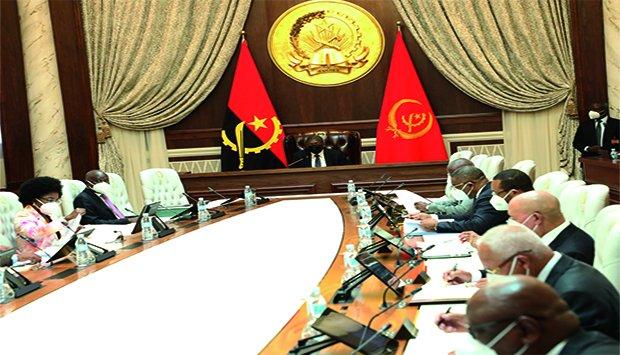Africa-Press – Angola. The Council of Ministers approved, Wednesday (23), the new Organic Statute of the General Labor Inspectorate (IGT), under which the Center for Health and Safety at Work (CSST), previously an autonomous structure, now integrates that body of the State’s Indirect Administration, with all its assets and liabilities.
The Minister of Public Administration, Labor and Social Security (MAPTSS), Teresa Dias, explained to the press, at the end of the 2nd ordinary session of the Council of Ministers, guided by the President of the Republic, that, with the approval of the new organic structure, the IGT now has an inspector-general, two assistant inspectors-general and four executive departments, as established by Presidential Legislative Decree 220, which deals with the organization, creation, operation and extinction of public institutes.
Just yesterday, the Council of Ministers also issued the Presidential decrees approving the IGT Special Career Remuneration Scheme and the Labor Inspector Statute.
The first diploma aims to standardize remuneration positions and give greater dignity to the inspection function of employees of the IGT’s special regime, based on a remuneration policy of integrity.
Minister Teresa Dias said that three subsidies had been approved that had long been demanded to give greater dignity to inspectors, namely the special inspection, dueternity and social benefits for work accidents and occupational diseases.
In addition to these, she recalled, the IGT already has allowances for attire, dedication and risk.
The Labor Inspector Statute aims to standardize the exercise of the activity of labor inspectors, determining, among other aspects, the level of their technical autonomy, the set of competences, their work regime, the structure of the inspection career and the of entry and access to the respective inspection career.
Teresa Dias said that the inspector’s activity had been standardized, as well as entry and access to the IGT as a special regime career. With the new diploma, she clarified, it is intended to give more dignity to the inspector-general of work, so that entry, until their progression, is guided by a document that inspectors can have as a basis for their professionalization.
“In order to give itself greater dignity, MAPTSS understands that, with these three documents, the conditions are created to have a dignified, more cohesive, more effective and more efficient General Labor Inspectorate, with a view to putting an end to what which are the great responsibilities that the moment imposes and the future will impose”, concluded the minister.
Yesterday, the Social Worker’s Career Remuneration Statute was also approved, with a view to adapting it to the legislation in force on the matter and to the country’s socio-economic reality.
Presidential Decree approves prospecting in Block 24
The Council of Ministers approved the Draft Presidential Decree granting the national concessionaire the mining rights to prospect, research, develop and produce liquid and gaseous hydrocarbons in the Block 24 concession area.
The Secretary of State for Petroleum, José Alexandre Barroso explained that Presidential Decree 305/11, of 15 December, granted the national concessionaire the prospecting rights in that area and signed a production sharing contract with a group of contractors made up of BP and Sonangol Pesquisa & Produção.
The Decree, he said, granted this contractor group a period of eight years to carry out research. However, this was not done and as the contractor also did not request the extension of the contract, it was terminated due to expiry.
In fact, a new Presidential Decree was submitted for approval by the Council of Ministers so that that area can once again be granted to the National Agency for Petroleum, Gas and Biofuels (ANPG), so that it can enter into a service contract with risk with a contractor group made up of an American company, the Entank Group, and Sonangol, so that, on behalf of the ANPG, they can carry out research and production operations on that block.
“This measure is part of the strategies and priorities defined for the development of the Angolan oil sector, with the objective of transforming the oil potential into commercial reserves and, thus, contributing to the gradual increase in the production of hydrocarbons and, in particular, of gas “, said José Barroso. The Secretary of State assured that the American company – which in terms of classification fits into the medium-sized ones – is credible for the operation. “The national concessionaire, before joining any company, carries out a process of ‘duo diligence’ to ensure that it has the legal conditions and financial capacity to engage in this type of activity”, he said.
New fee table for environmental impact licenses
As part of improving the business environment in Angola and promoting administrative simplification, the Council of Ministers yesterday approved a new table of fees and charges for issuing licenses and assessing environmental impacts, as well as for the registration of environmental consulting societies and their renewal.
For More News And Analysis About Angola Follow Africa-Press






